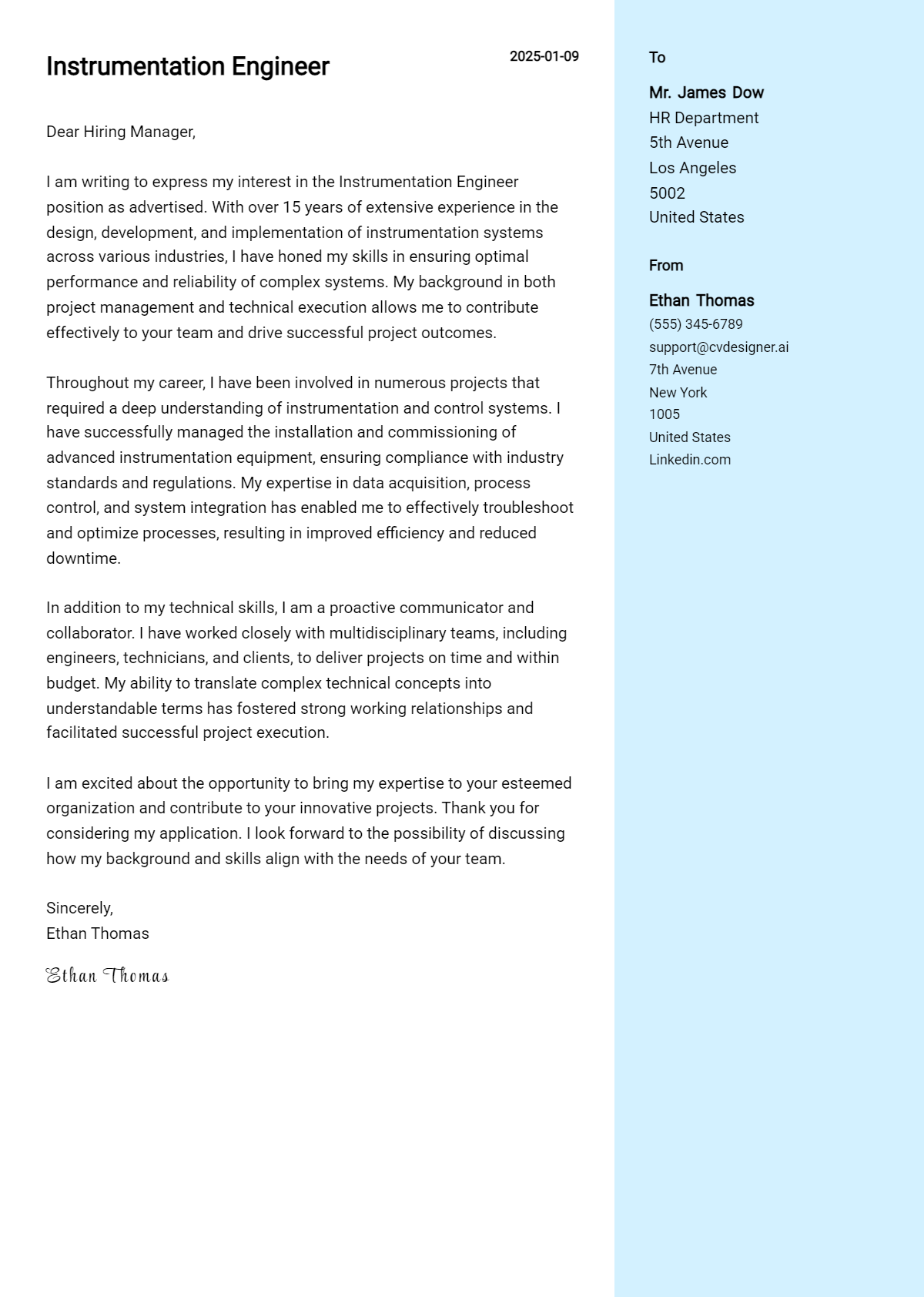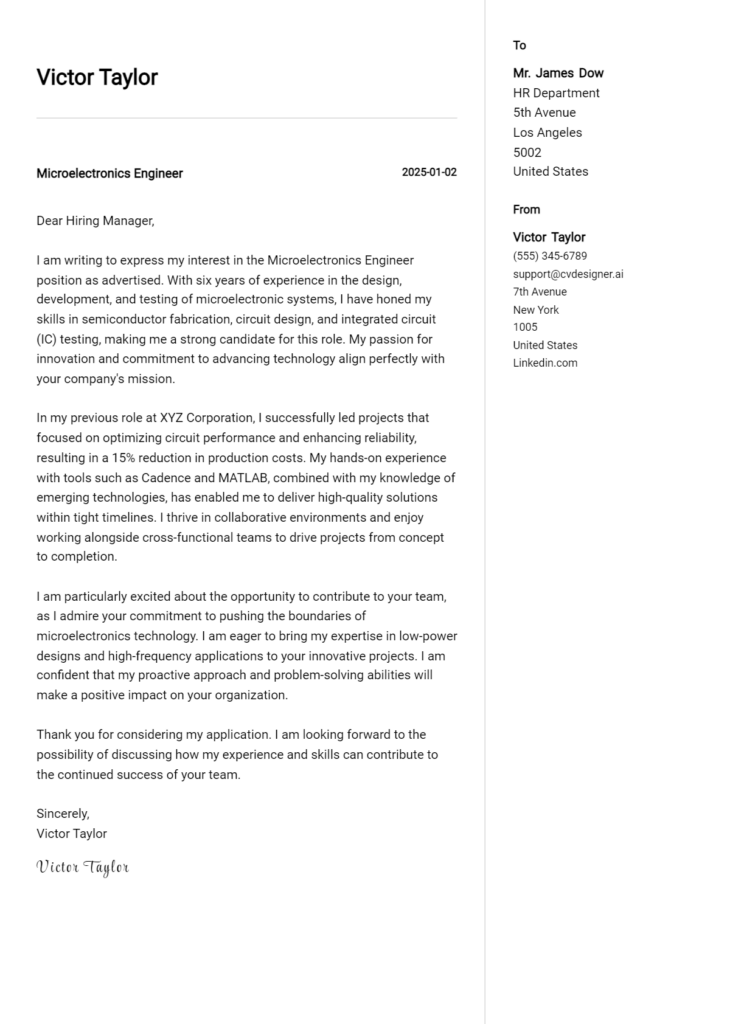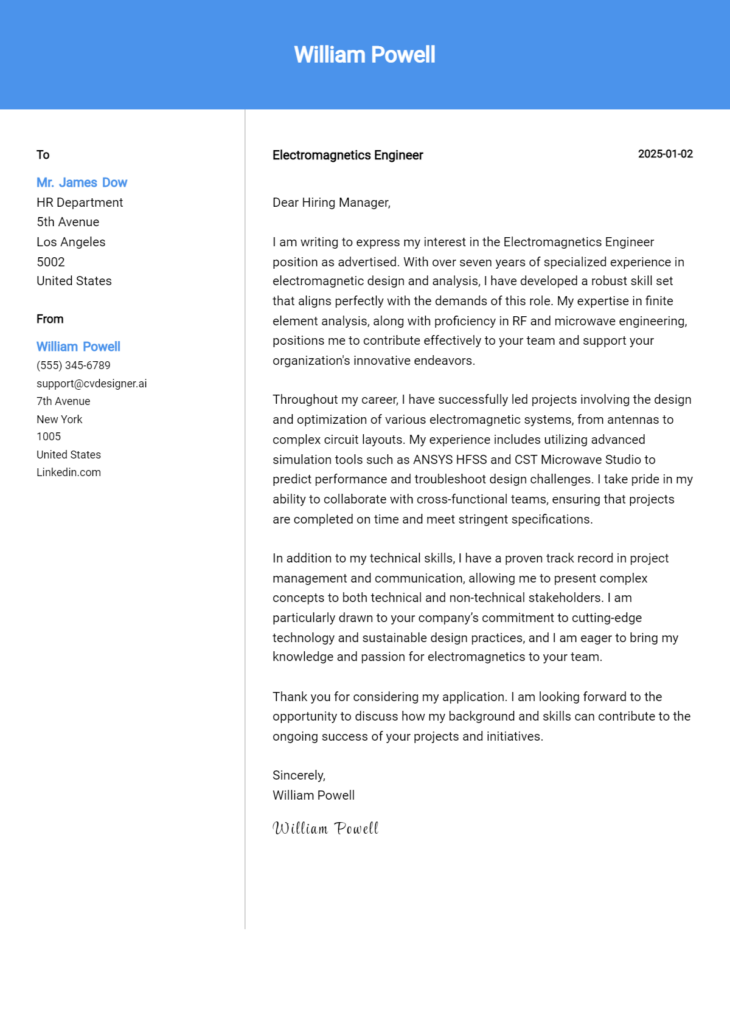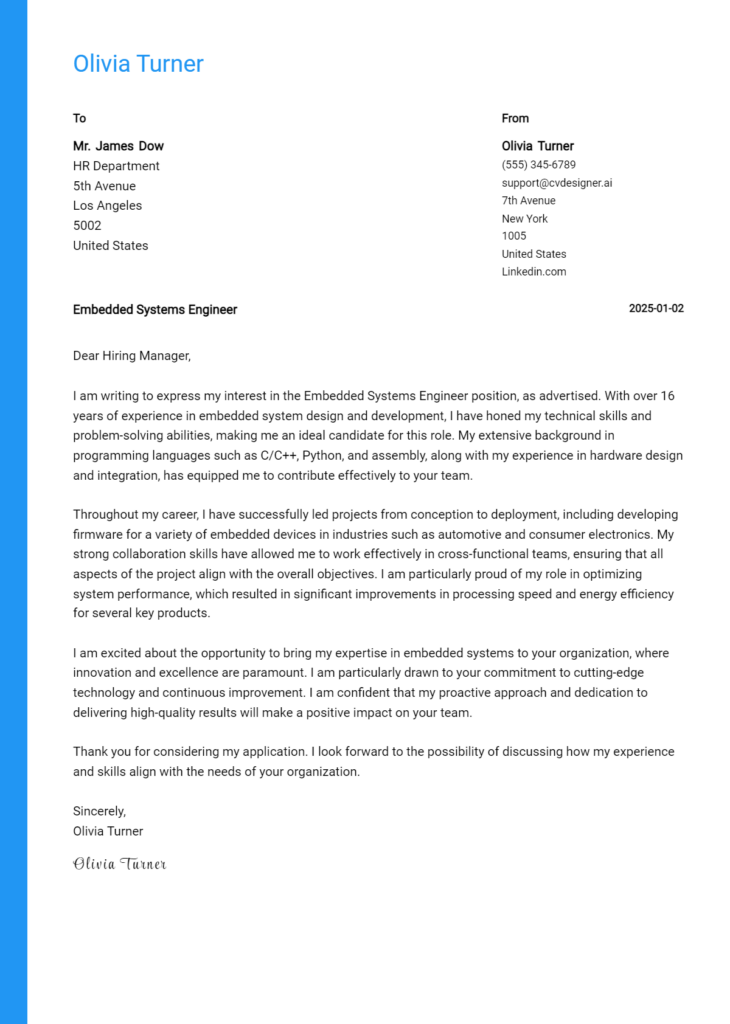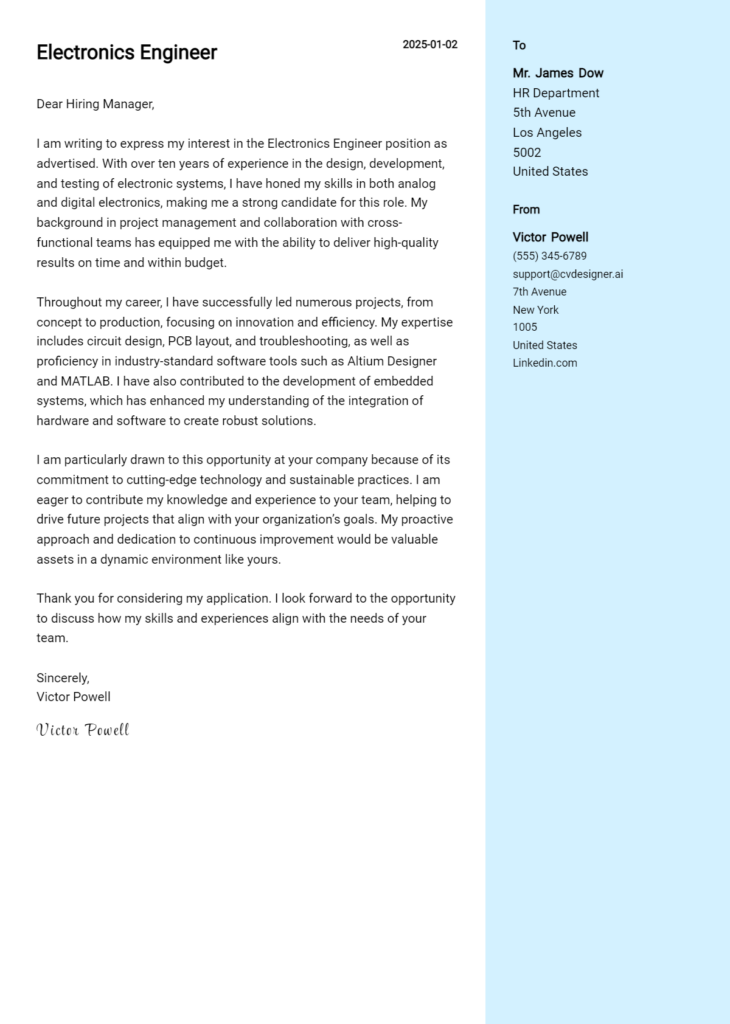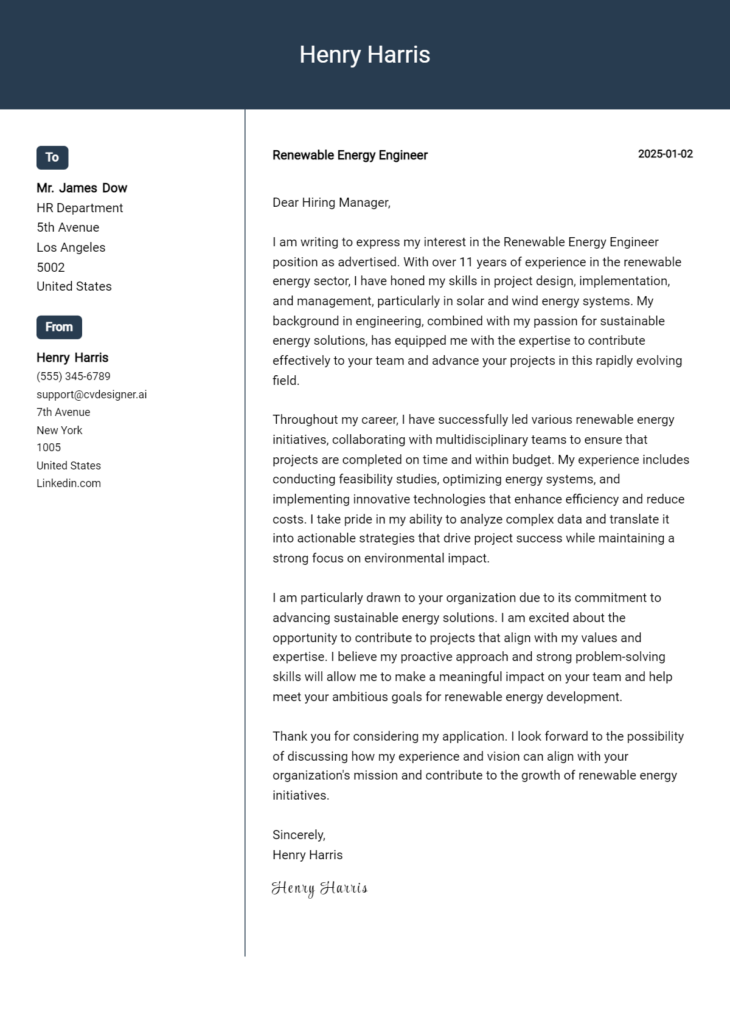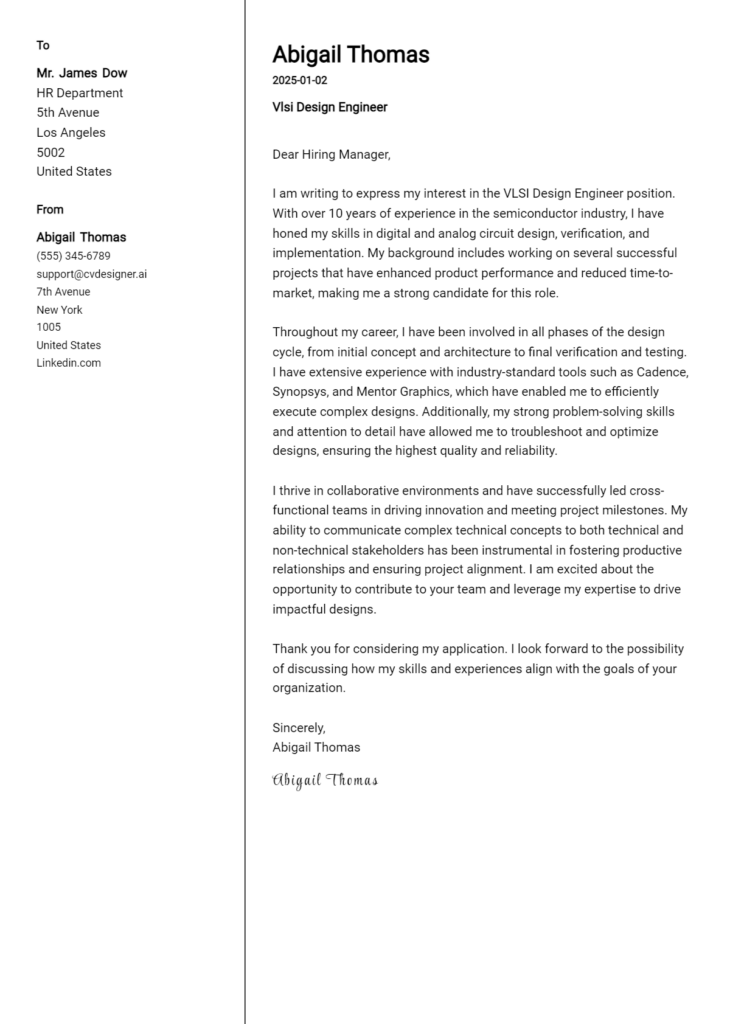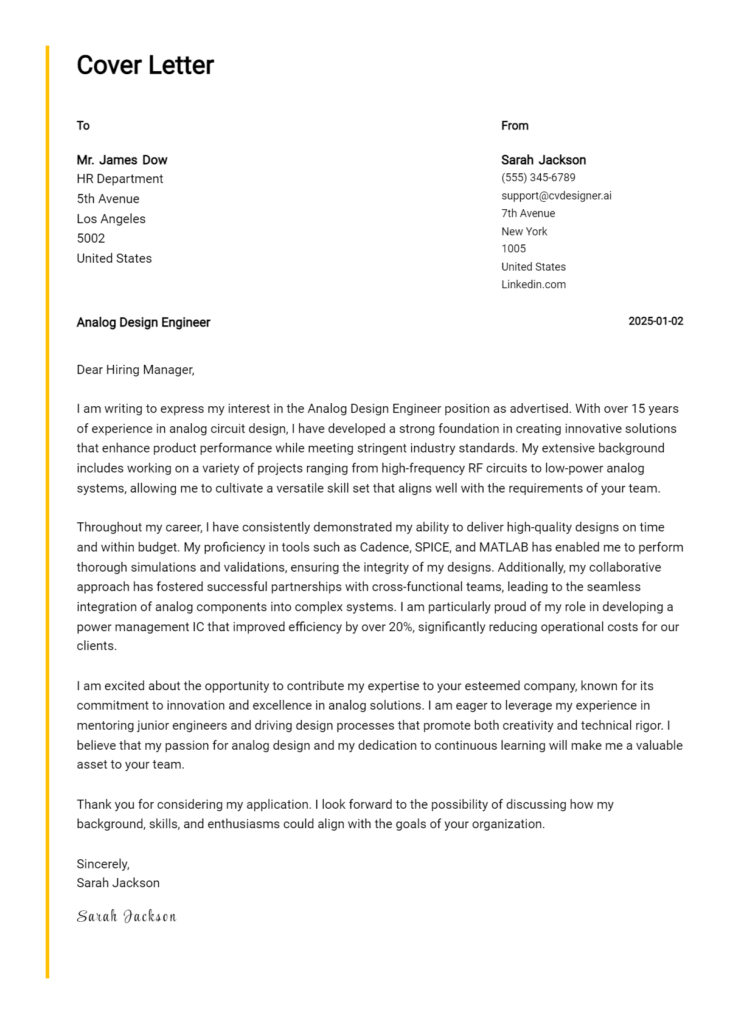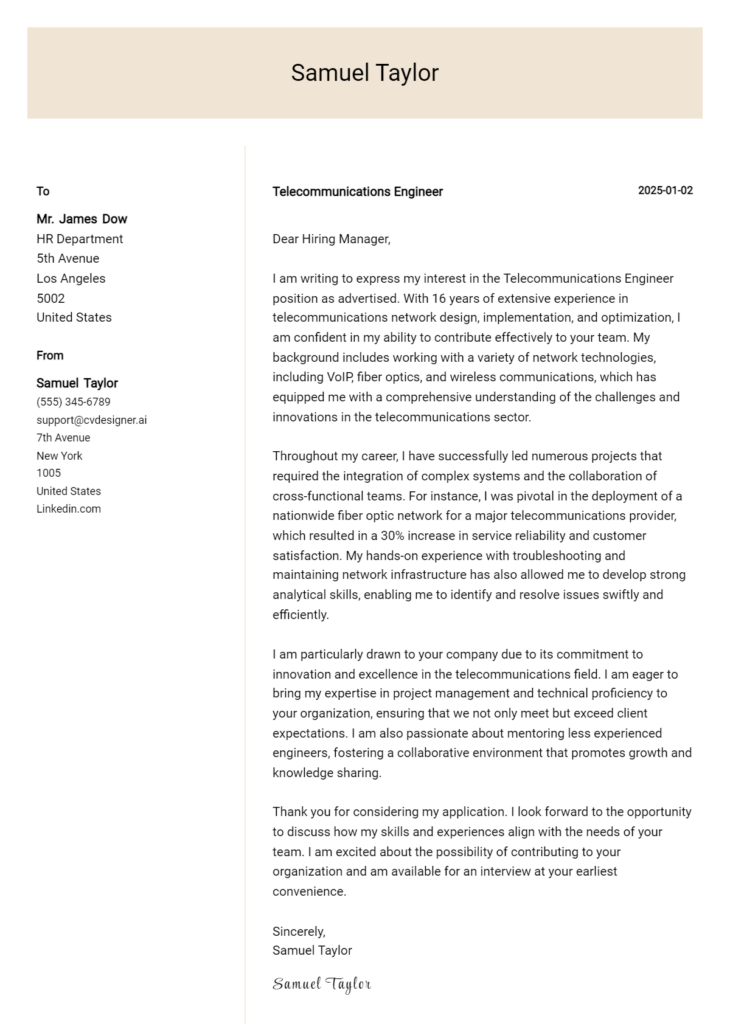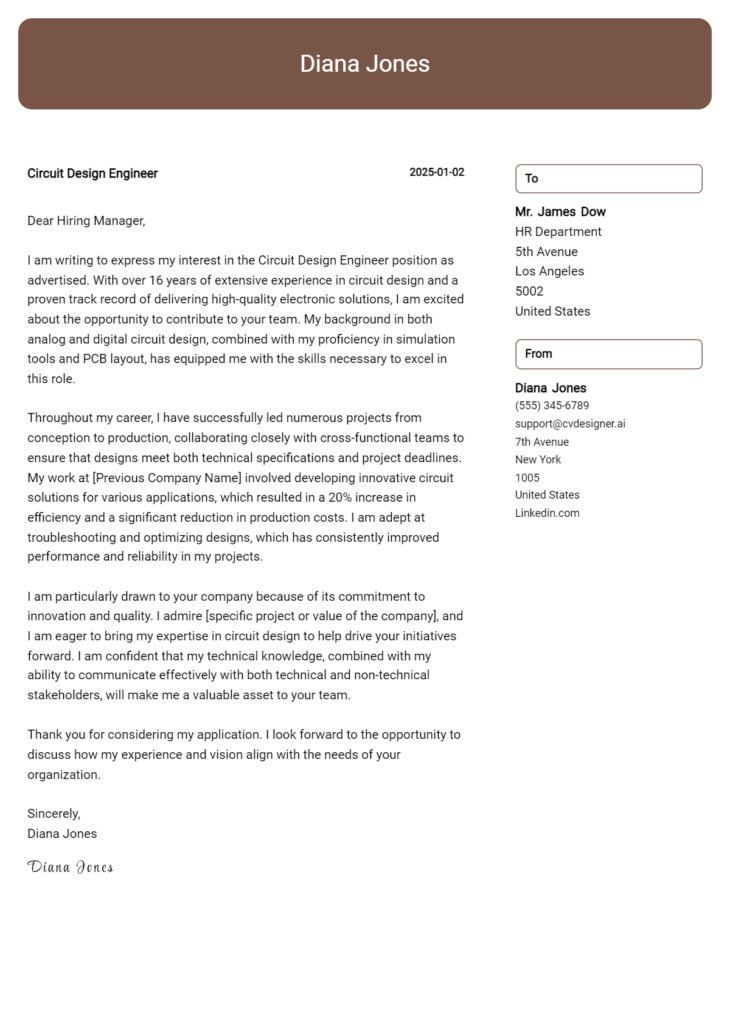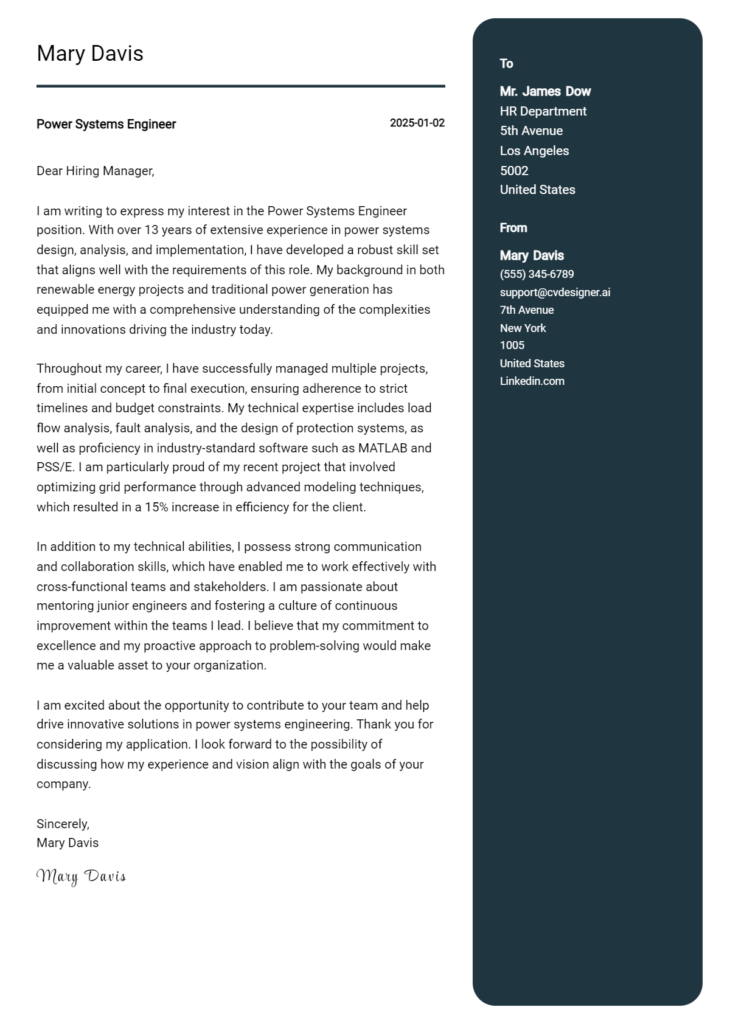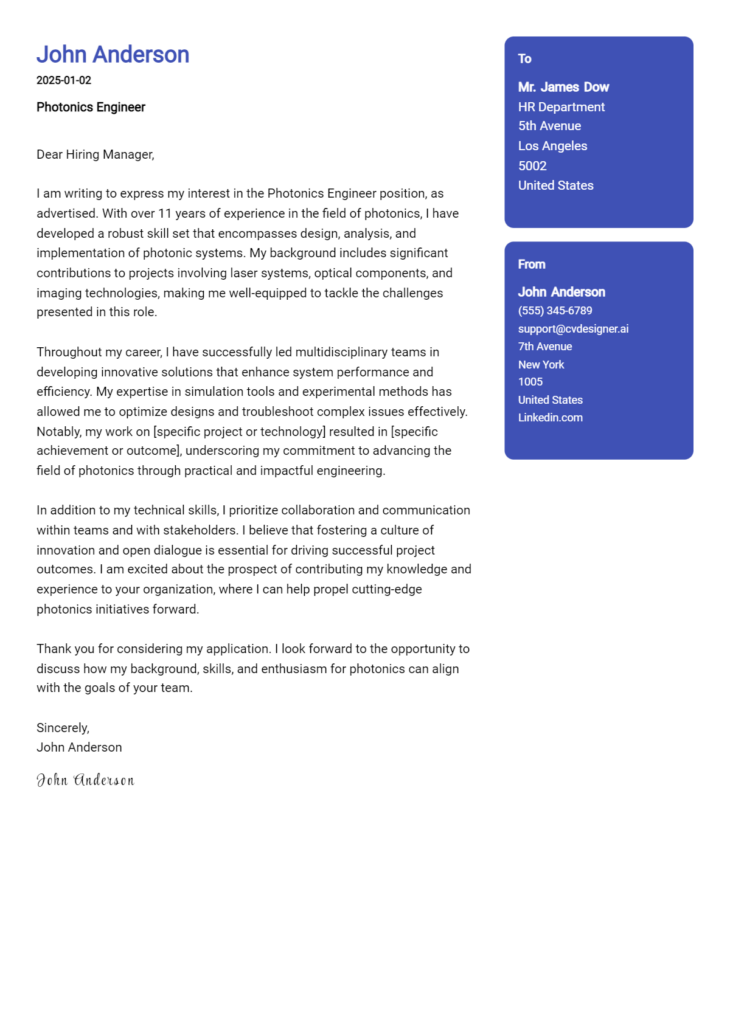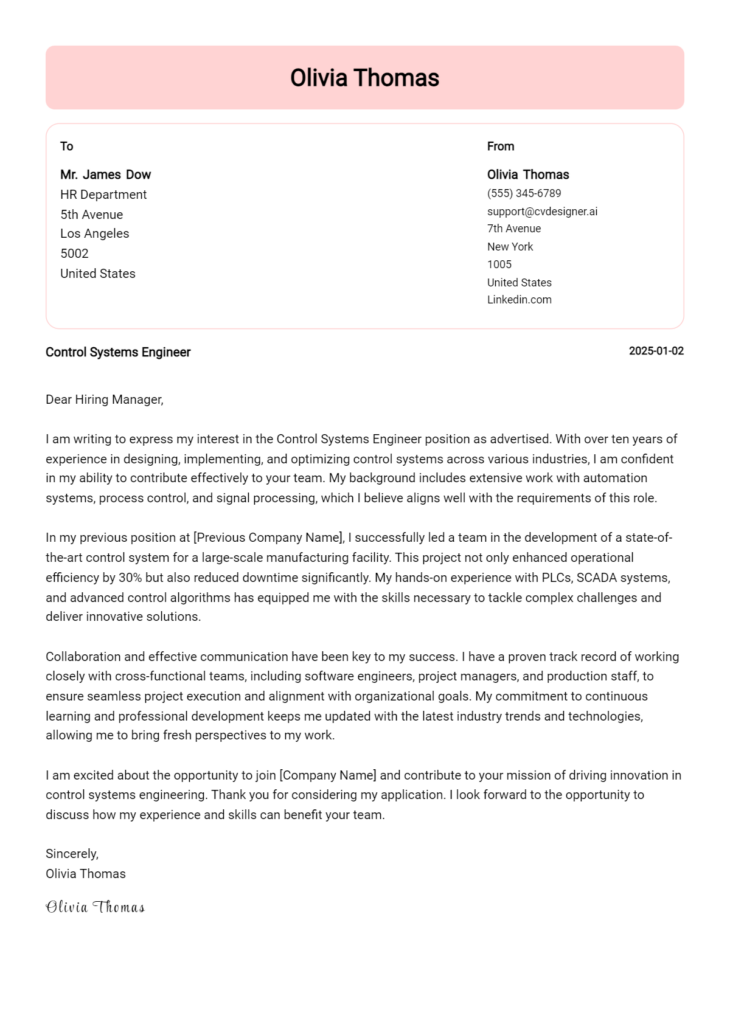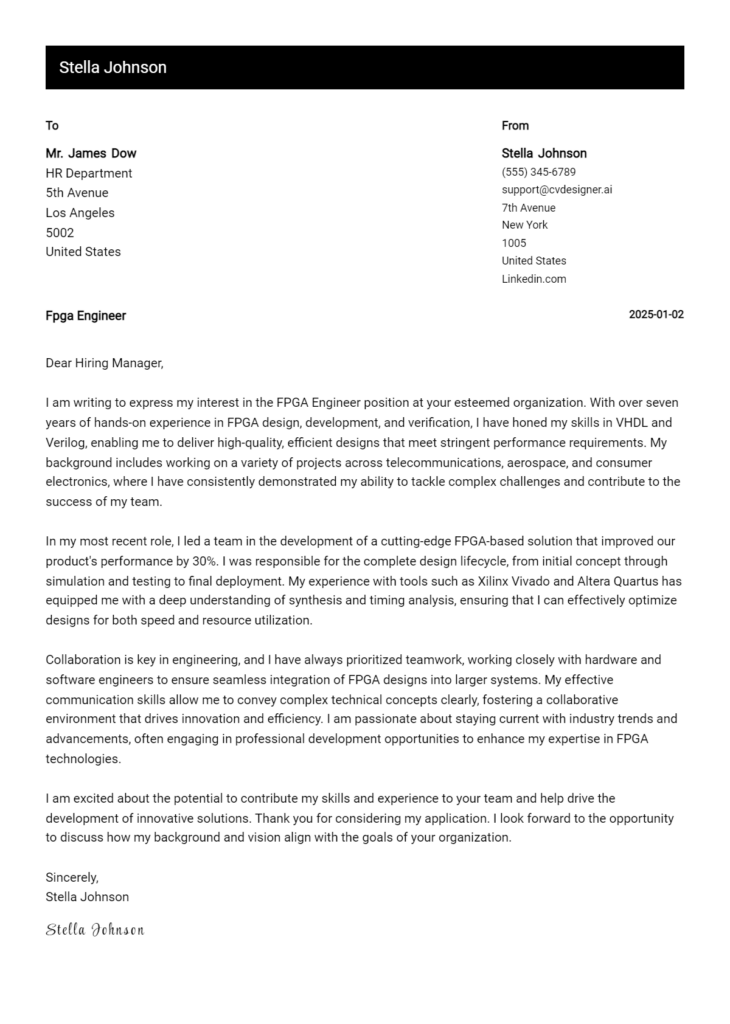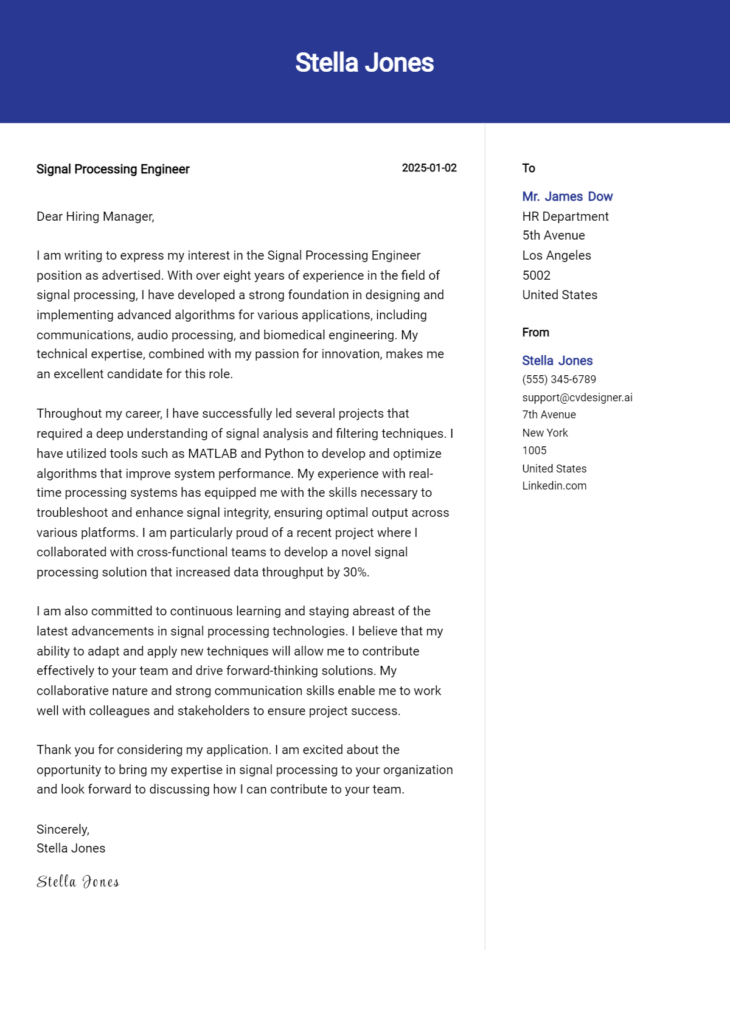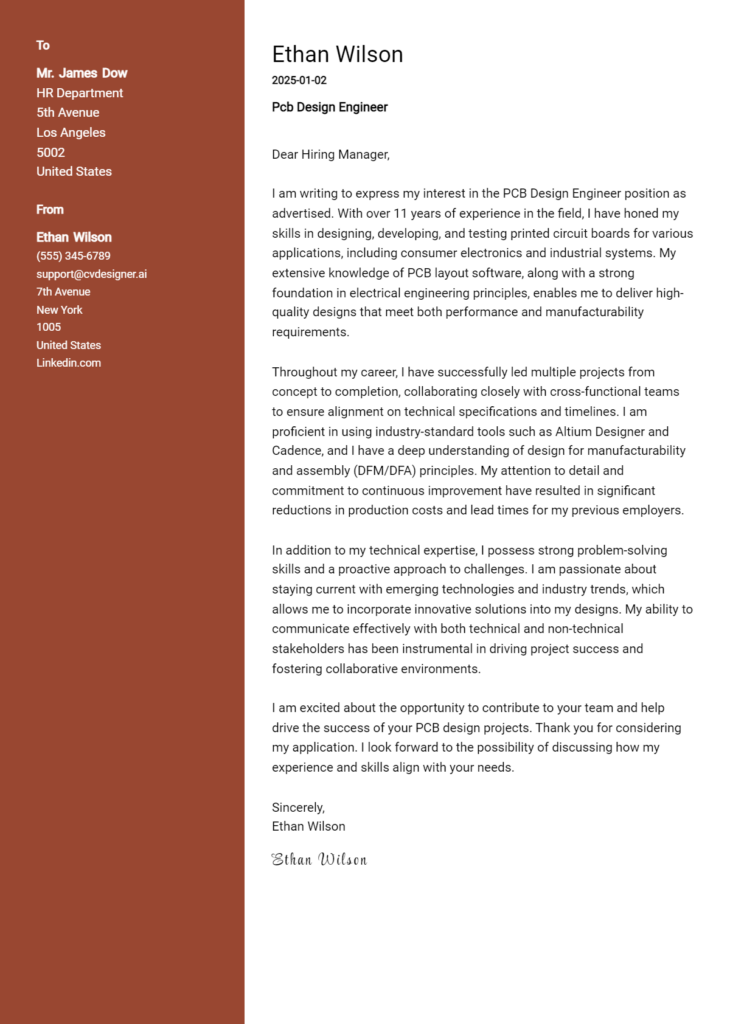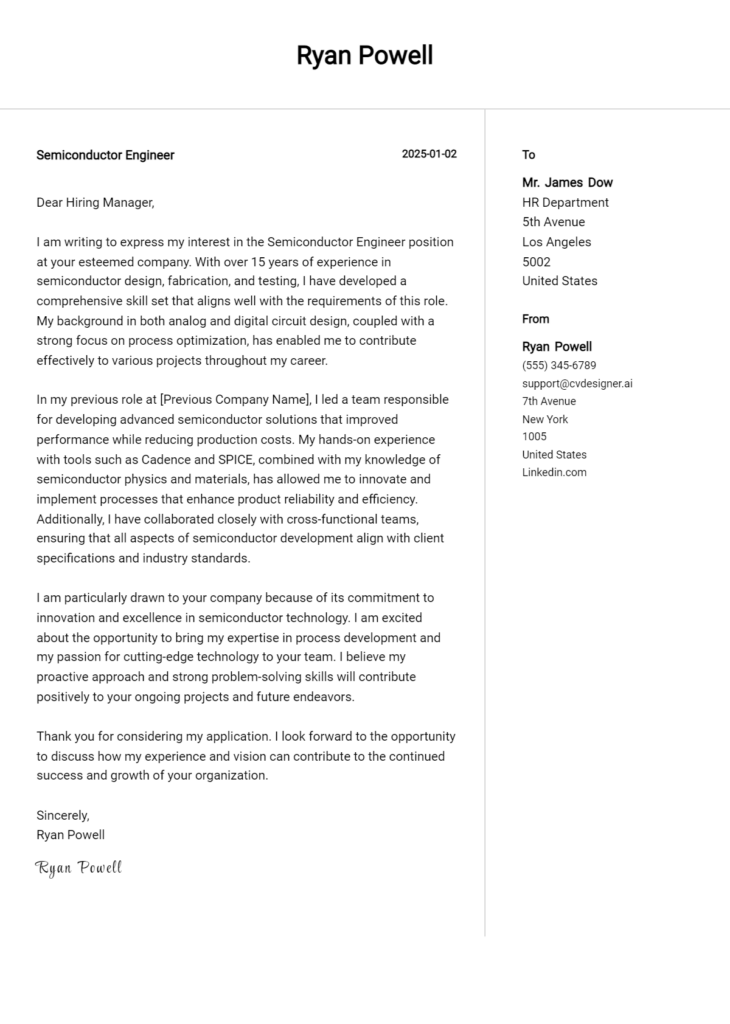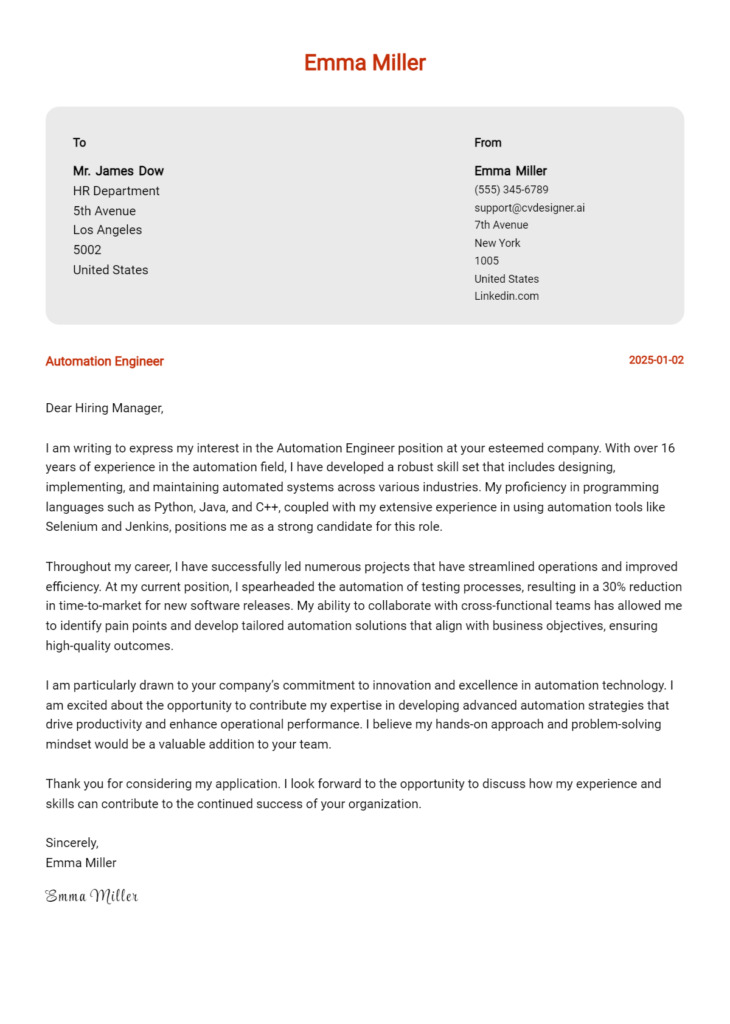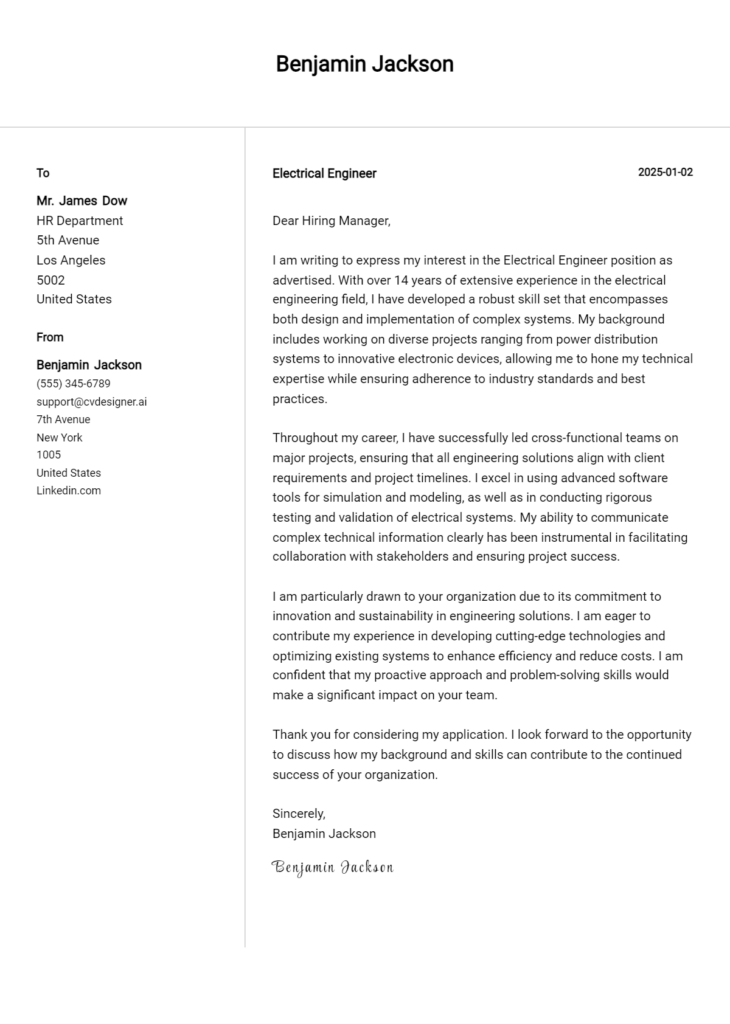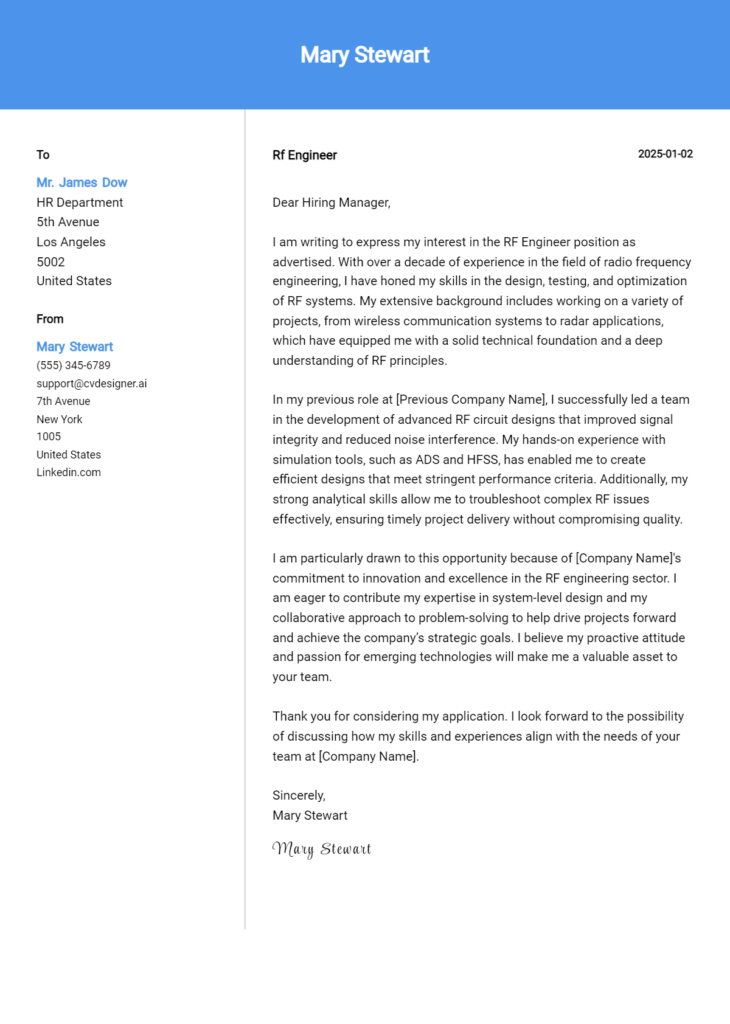Instrumentation Engineer Cover Letter Examples
Explore additional Instrumentation Engineer cover letter samples and guides and see what works for your level of experience or role.
How to Format an Instrumentation Engineer Cover Letter
Crafting a well-structured cover letter is essential for an Instrumentation Engineer, as it not only showcases your technical skills but also reflects your ability to communicate effectively—a vital trait in engineering. The format of your cover letter serves as a first impression, allowing you to demonstrate your organizational skills and attention to detail, both of which are crucial in the instrumentation field.
In this guide, we’ll outline how to structure your cover letter, providing insights and engineering-specific examples to help you create an impressive document.
We will focus on the essential components of a professional cover letter, including:
- Cover Letter Header
- Cover Letter Greeting
- Cover Letter Introduction
- Cover Letter Body
- Cover Letter Closing
Each section plays a critical role in highlighting your qualifications and professionalism. Let’s break down each part and explain how to make your instrumentation engineer cover letter stand out.
Importance of the Cover Letter Header for an Instrumentation Engineer
The cover letter header is a critical component of your application as an Instrumentation Engineer, as it sets the tone for your professionalism and attention to detail. A well-structured header not only provides essential contact information but also establishes clarity from the outset. It should include your name, address, phone number, email, the date, and the recipient's details (name, title, company, and address). This clarity helps ensure that your application is easily navigable and presents you as a serious candidate.
A strong header reflects your commitment to presenting yourself professionally, while a weak one may detract from your qualifications and give the impression of carelessness.
Strong Example:
John Doe 1234 Engineering Lane Cityville, ST 12345 (123) 456-7890 john.doe@email.com March 15, 2023 Jane Smith HR Manager ABC Engineering Solutions 5678 Industry Drive Cityville, ST 12345
Weak Example:
johndoe@email.com 12345 March 15, 2023 HR ABC
The Importance of the Cover Letter Greeting
The greeting of your cover letter is crucial as it sets the tone for the rest of your correspondence. A well-crafted greeting demonstrates professionalism and shows that you respect the hiring manager's time and position. By addressing the hiring manager directly, you create a sense of personalization that can help your application stand out. It's important to avoid generic greetings like "To Whom It May Concern," as they can come off as impersonal and may suggest a lack of effort in researching the company. If you're unsure of the hiring manager’s name, take the time to look it up on the company’s website or LinkedIn. A thoughtful greeting can make a positive first impression and set the stage for a compelling narrative about your qualifications as an Instrumentation Engineer.
Strong Greeting Example
Dear Mr. Smith,
Weak Greeting Example
To Whom It May Concern,
The Importance of a Strong Cover Letter Introduction for an Instrumentation Engineer
A well-crafted cover letter introduction is crucial for an Instrumentation Engineer seeking to make a lasting impression on potential employers. It serves as the first opportunity to capture the hiring manager's attention, demonstrating genuine interest in the role while highlighting relevant skills and achievements. An effective introduction not only sets the tone for the rest of the cover letter but also helps to create a compelling narrative that showcases why the candidate is the ideal fit for the position. Below are examples of strong and weak introductions to illustrate this point.
Strong Example
Dear [Hiring Manager's Name], As a dedicated Instrumentation Engineer with over five years of experience in designing and implementing cutting-edge control systems, I am excited to apply for the Instrumentation Engineer position at [Company Name]. My proven track record of optimizing process efficiency and a strong foundation in PLC programming and instrumentation calibration uniquely position me to contribute effectively to your team. I am eager to bring my technical expertise and innovative mindset to [Company Name] to help drive forward your projects and enhance operational performance.
Weak Example
To whom it may concern, I am writing to apply for the Instrumentation Engineer job. I have some experience in the field and I am hoping to find a job where I can use my skills. I know how to do a few things with instruments and control systems.
Purpose of the Cover Letter Body for an Instrumentation Engineer
The body of a cover letter for an Instrumentation Engineer serves as a critical platform for candidates to effectively communicate their technical skills, relevant experiences, and the unique value they can bring to the company. This section should succinctly highlight specific projects or accomplishments that demonstrate the applicant's proficiency in instrumentation design, control systems, and troubleshooting. By providing concrete examples, candidates can illustrate their problem-solving abilities and their impact on previous employers, which can significantly enhance their appeal to potential employers.
Strong Example
I am an accomplished Instrumentation Engineer with over five years of experience in the oil and gas industry, where I successfully led a project to upgrade the control systems at a refinery. This initiative resulted in a 15% increase in operational efficiency and reduced downtime by 20%. My expertise in PLC programming and instrumentation design enabled me to implement state-of-the-art solutions that optimized performance and ensured compliance with safety regulations. Additionally, I collaborated with cross-functional teams to enhance system reliability, proving my ability to align technical projects with business objectives.
Weak Example
I have worked as an Instrumentation Engineer for a few years. I have done some projects but they weren't very important. I know how to use various tools and technologies related to instrumentation. I think I would be a good fit for your company because I am hardworking and willing to learn.
Importance of Cover Letter Closing for an Instrumentation Engineer
The closing of a cover letter for an Instrumentation Engineer is a critical component that leaves a lasting impression on the hiring manager. It serves to summarize your qualifications, reiterate your enthusiasm for the role, and encourage the next steps such as reviewing your resume and scheduling an interview. A strong closing reinforces your suitability for the position while demonstrating professionalism and eagerness. Conversely, a weak closing may fail to engage the reader, leaving them with uncertainty about your fit for the role or interest in the position.
Strong Example
Thank you for considering my application for the Instrumentation Engineer position. With my extensive experience in designing and implementing instrumentation systems, along with my passion for optimizing industrial processes, I am excited about the opportunity to contribute to your team. I look forward to the possibility of discussing my qualifications in more detail and am eager to explore how I can support your projects. Please feel free to review my resume for further insights, and I hope to schedule an interview soon.
Weak Example
Thanks for looking at my cover letter. I think I might be a good fit for the Instrumentation Engineer job. I hope you like my resume. Let me know if you want to talk.
When applying for a position as an Instrumentation Engineer, a well-crafted cover letter can significantly enhance your chances of standing out among other candidates. This document serves as your opportunity to showcase not only your technical skills but also your problem-solving abilities, knowledge of the Software Development Life Cycle (SDLC), and your capacity for teamwork. Furthermore, expressing a passion for continuous learning can resonate well with potential employers. Below are some essential tips to help you create an effective cover letter tailored for this role.
Tips for Crafting an Effective Cover Letter for Instrumentation Engineers
Highlight Technical Skills
Clearly outline your technical expertise related to instrumentation engineering. Mention specific tools, technologies, or methodologies you are proficient in, such as PLC programming, control systems, or instrumentation design. Use quantifiable examples where possible, such as projects you’ve completed or improvements you’ve implemented, to illustrate your capabilities.Showcase Problem-Solving Abilities
Discuss specific instances where you successfully resolved complex engineering challenges. Describe the problem, the steps you took to address it, and the outcome. This not only demonstrates your analytical skills but also your ability to think critically under pressure, a crucial trait for an Instrumentation Engineer.Demonstrate Knowledge of SDLC
Employers often look for candidates who understand the Software Development Life Cycle, especially in roles that involve automation and control systems. Briefly explain your experience with SDLC processes, such as requirements gathering, design, implementation, testing, and maintenance. This shows your holistic understanding of how instrumentation projects fit into larger engineering practices.Emphasize Teamwork and Collaboration
Engineering is rarely a solo endeavor; emphasize your experience working in teams. Provide examples of successful collaborations with cross-functional teams, such as electrical engineers, software developers, and project managers. Highlight your role in these teams and how you contributed to achieving collective goals, reinforcing your ability to work well with others.Express a Passion for Continuous Learning
The field of instrumentation engineering is constantly evolving, making it essential for professionals to stay updated with the latest advancements. Mention any recent courses, certifications, or workshops you’ve pursued that are relevant to the position. This demonstrates your commitment to professional growth and adaptability in a fast-paced industry.
By following these tips, you can create a compelling cover letter that effectively showcases your qualifications for an Instrumentation Engineer role. For additional resources, consider exploring cover letter templates or utilizing a cover letter builder to streamline your writing process.
Common Mistakes to Avoid in a Instrumentation Engineer Cover Letter
Crafting a compelling cover letter is essential for standing out as an Instrumentation Engineer. Avoiding common pitfalls can significantly enhance your chances of making a positive impression on potential employers. Here are some mistakes to steer clear of, along with tips on how to avoid them:
Generic Salutation: Using a generic greeting like "To whom it may concern" can make your cover letter seem impersonal. Instead, research the hiring manager's name and address them directly.
Rehashing Your Resume: Simply repeating information from your resume fails to engage the reader. Instead, highlight specific achievements and how they relate to the job description.
Lack of Focus: A cover letter should be concise and relevant. Avoid including unrelated work experiences. Tailor your content to emphasize skills and experiences that directly align with the instrumentation engineering role.
Poor Formatting: Neglecting the proper cover letter format can make your document hard to read. Follow best practices to ensure clarity and professionalism; you can find helpful tips on formatting here.
Spelling and Grammar Errors: Typos can leave a negative impression. Always proofread your letter multiple times or utilize online tools to catch any errors.
Lack of Enthusiasm: A cover letter should convey your passion for the field. Avoid a monotonous tone; instead, express your excitement about contributing to the company as an Instrumentation Engineer.
Ignoring the Company Culture: Failing to research the company's values and culture can lead to a mismatch. Demonstrate your understanding of their mission and how you would fit within their team.
By being mindful of these common mistakes, you can create a polished and effective cover letter that showcases your qualifications as an Instrumentation Engineer. For additional inspiration, consider reviewing various cover letter examples to help you get started.
Cover Letter FAQs for Instrumentation Engineer
What should I include in my cover letter as an Instrumentation Engineer?
In your cover letter, focus on highlighting your technical skills and relevant experience in instrumentation engineering. Start with a brief introduction that states the position you are applying for. Include specific projects where you applied your expertise in designing, implementing, or maintaining instrumentation systems. Mention your proficiency with industry-standard tools and software, and any certifications or qualifications that set you apart. It’s also beneficial to discuss your ability to work collaboratively in multidisciplinary teams and any experience you have with regulatory compliance and safety standards. Finally, express your enthusiasm for the role and how your background aligns with the company’s goals.
How can I tailor my cover letter for a specific job?
To tailor your cover letter, research the company and the specific role you're applying for. Identify key responsibilities and skills listed in the job description and reflect on your relevant experience. Use language and terminology that resonate with the company's mission and values. Highlight specific achievements that match the job requirements, such as successful project completions, innovative solutions you've implemented, or experience with particular technologies they use. Personalize your introduction by mentioning the company name and expressing genuine interest in how your skill set can contribute to their projects. This demonstrates your commitment and attention to detail.
Should I include technical jargon in my cover letter?
Including technical jargon in your cover letter can be beneficial, but it should be used judiciously. It's important to convey your expertise, but remember that your cover letter may be read by HR personnel who may not have a technical background. Use clear and concise language while incorporating key terms relevant to instrumentation engineering, such as “control systems,” “process automation,” or “calibration techniques.” Strive for a balance where you demonstrate industry knowledge without overwhelming the reader. If possible, explain any jargon or acronyms briefly to ensure clarity. This approach showcases your technical proficiency while ensuring your letter is accessible.
How long should my cover letter be?
Your cover letter should ideally be one page long, consisting of three to four concise paragraphs. Aim for around 250 to 400 words total. This length allows you to provide sufficient detail about your qualifications and experiences without overwhelming the reader. Use a clear structure: an engaging introduction, a body that highlights your relevant skills and achievements, and a strong conclusion that reiterates your interest in the position. Be mindful of readability; use short paragraphs and bullet points if necessary to enhance clarity. Keeping your cover letter succinct yet informative will make a positive impression on potential employers.
Build your Cover Letter in minutes
Use an AI-powered cover letter builder and have your letter done in 5 minutes. Just select your template and our software will guide you through the process.

